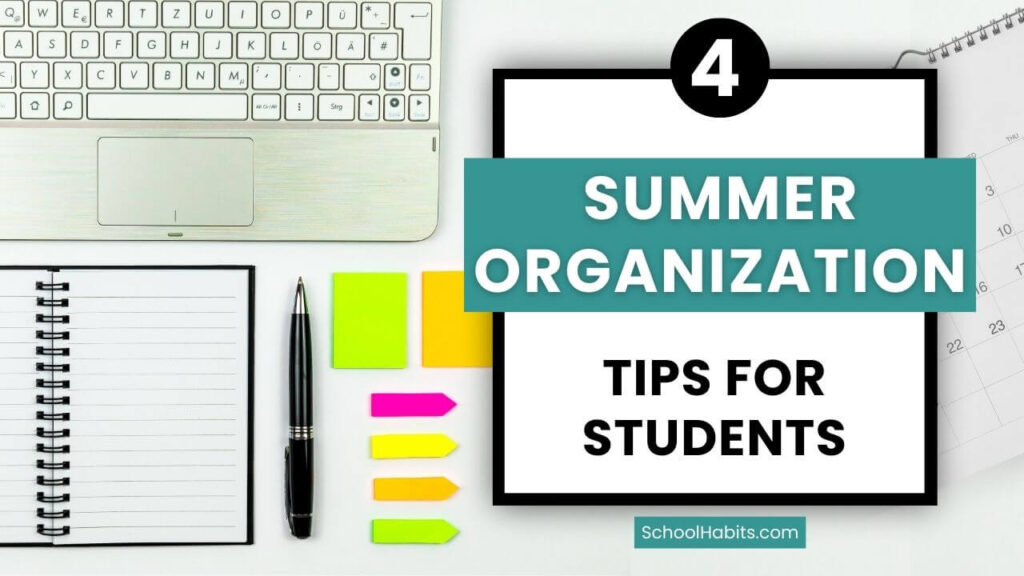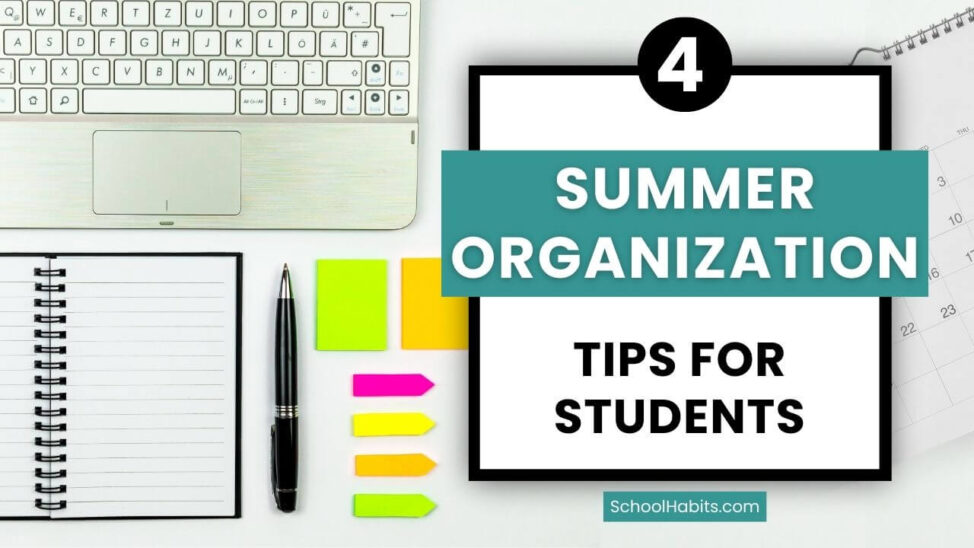
By Katie Azevedo, M.Ed.
Summer break is for family, friends, part-time jobs and all the things you do when you’re not in school. But summer is also the perfect time to get a few areas of your life in order so you feel better about starting class again in the fall.
In this blog post, I share some summer organization tips for students. The organization tips will help you now, and they’ll also help you have a better school year start. Each of the tips below is simple enough to do in an afternoon. If you set aside a few hours, you could do all four in the same day.
4 Summer Organization Tips for Students Who Want a Better School Year Start
Organizing each of the areas below over the summer will help you start the school year with clarity. Why is this important? Because clarity is the single most important element of organization.
1. Organize Your Calendar and Schedule
There are exceptions to everything, but most students have more free time over the summer than they do during the school year. This usually causes students to fully abandon time management during summer break.
But this is a mistake.
There are exceptions to everything, but most students have more free time over the summer than they do during the school year. This usually causes students to fully abandon time management during summer break.
But this is a mistake.
Organizing your calendar and your schedule over the summer can lead to better time management during the school year because you’ll be sustaining and building time management habits and skills.
Hear me out. I know that might sound cheesy, but the more we do something, especially on the days we don’t need to do it, the better and stronger we build a habit.
If you fully let go of your calendar habit and time management skills over the summer, it’s going to be so much harder to reestablish that habit when school starts again in the fall.
If you’re insisting that you have no reason to use a calendar over the summer, I challenge you. Here are 9 ways to use a calendar over the summer that will increase your organization.
In addition to the 9 ways to use a calendar over the summer that I linked above, you can set up your calendar for the upcoming school year as soon as you get your class schedule. Here’s a step-by-step tutorial for creating your school schedule inside Google Calendar.
2. Set Up and Organize Your Note-Taking System
The summer is the perfect time to create and organize your note-taking system for the upcoming school year.
You might be thinking but I don’t take notes over the summer. Fair enough, although that’s not what I’m talking about here.
When you’re in high school, college, or graduate school, note-taking is one of the primary ways that you learn information. If you don’t have a note system that works for you, then learning becomes so much harder.
If you’ve always struggled with note-taking, that’s one of the core skills I teach inside SchoolHabits University and that might be exactly what you need.
As you create or refine your note-taking system, you want to ask yourself the following questions:
- What did I do in the past that worked for me?
- What did I do in the past that did not work for me?
- How do I like to take notes?
- How do I like to go back to my notes (do I like to flip through paper? or scroll through a digital document?)
- Are my notes useful to me?
- What could make my notes better?
- What could make my notes more useful?
- How can I make my note-taking system simpler?
Something I mention a lot in my note-taking YouTube tutorials and in my Learn and Work Smarter podcast episodes about note-taking is the importance of taking notes that are useful.
If your notes are not useful to you when you go back to use them, then you need to make an adjustment. A common mistake I see students make is using note-taking methods that increase how fast they’re able to take notes (for example: typing), but that decrease the usefulness of their notes when the time comes to use them.
3. Organize Your Digital Storage Space
Our digital storage spaces can quickly become total chaos if we don’t have a system for managing our files and assets.
Our digital storage spaces include our email inbox, Google Drive/OneDrive, Google Docs, our downloads folder, our desktop, and wherever else we tend to accumulate digital files.
When I work with students and professionals to organize their digital spaces, a common piece of resistance I hear is “I can store whatever I want because my device has a lot of memory…” or something like that.
But people who think this way are missing the entire point.
Organizing our digital spaces has nothing to do with our device’s storage capacity. Instead, the whole point of organizing our digital spaces is so that we can find what we’re looking for when we need it and achieve some kind of clarity about the things we’re holding onto.
The more junk we keep in our digital space, the less we remember what’s in there and the harder it is to find what we need when we need it.
Figuring out a digital file organization system depends on what level of schooling you’re in and what your needs are, but for most high school, college, and graduate students, I recommend having one folder for each year of school. Inside that primary school-year folder, create a folder for each of your classes.
That’s really all you need, and creating more layers of folders usually only leads to more confusion and disorganization.
Another tip for organizing your digital space is to make sure you name all your files in a way that’s useful to you all the time. For example, you could use a simple naming convention like [class name] + [document name].
For PDFs and other files that often download with absurd file names, create new titles that would make sense to the future you who is searching for these documents. If your response to that is I’ll never search for these documents again, then I question why you’re keeping them in the first place.
This is a great summer organization tip for students because the summertime is a perfect opportunity to go back and clean up your digital files from the previous year and create a folder system for the upcoming year.
4. Organize Your Study Space
If you are lucky enough to have a study space in your home, dorm room, or bedroom that you can leave set up and ready to go, that’s awesome.
(If you don’t have such a space and you often find yourself working at the kitchen table or wherever you can find an open spot, then this tip isn’t necessarily for you.)
But if you have a desk that you can call your own, the summertime is the perfect time to organize this space for the upcoming school year.
I have many tutorials that outline different study space design strategies according to your learning preference. I will link those below:
- How to organize a study space for visual learners
- How to organize a study space for auditory learners
- How to organize a study space for kinesthetic learners
In addition to those tips, I want you to keep the following principle in mind: function over flare.
What does that mean? It means that your study space should support the work that you do there. Everything on the surface and in the surrounding area should support you and help you be more efficient, focused, and productive. If an item in your study space does not help you be more efficient, focused and productive, then it belongs somewhere else.
Bonus Summer Organization Tips for Students (and a Better School Year Start!)
I know this blog post only features four summer organization tips for students, but in reality, the list could be so much longer. I chose these four areas because organizing your calendar, note-taking system, digital storage and study space often has the most dramatic impact on your overall academic experience once the school year starts.
Below are some additional summer organization tips that you might want to consider before going back to school in the fall:
- Go through your old backpack, clean it out and wash it
- Sort through your old school papers: throw away trash and consolidate and organize what you want to keep (use these tips to figure out what to save)
- Clear out your social media accounts. Delete accounts you don’t use anymore, and delete pictures and posts you don’t think represent who you are
- Declutter and organize your phone apps
- Organize your “Favorites” bar on your device
- Organize your photos
- Declutter and organize your email inbox. Use these student email management tips.
- Here are 100 more (I know! 100!) organization tips for students


